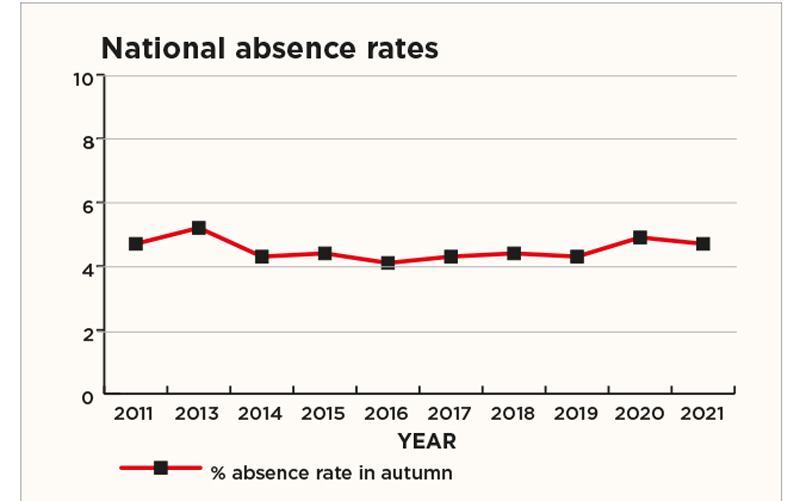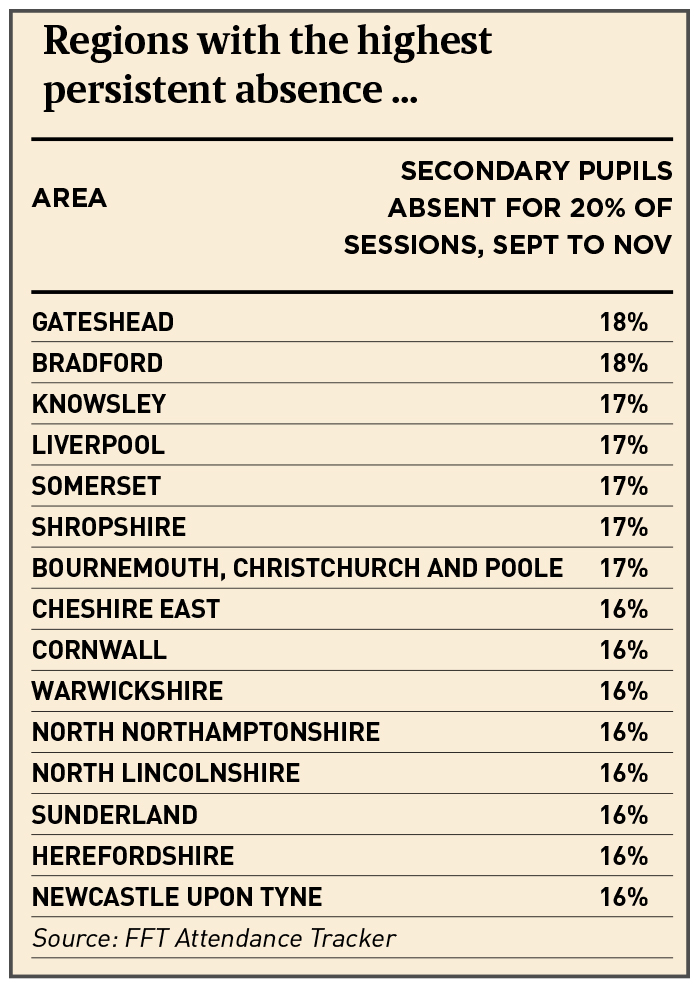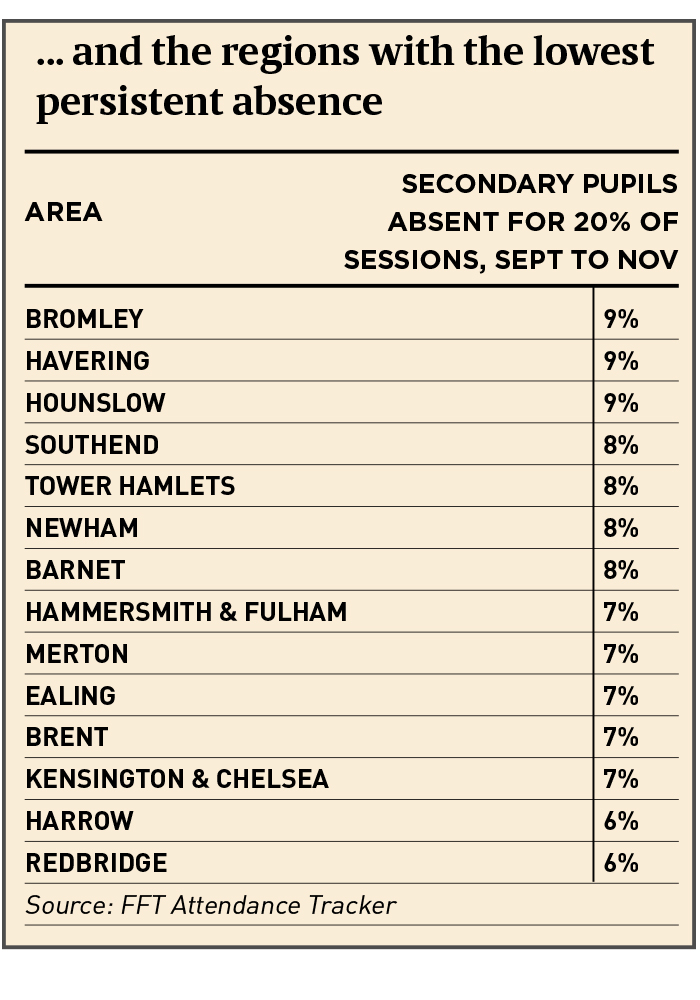Education secretary Nadhim Zahawi has ordered councils to tell parents that keeping their children off school has “repercussions” as he attempts to tackle rising absence rates.
It comes as analysis obtained by Schools Week reveals almost one in five pupils is effectively missing a day a week in the worst-hit areas.
Yet Zahawi faces demands from cash-strapped councils to fund the crackdown on the one hand, and threats of legal action and de-registration from parents worried about Covid on the other.
Schools Week investigates…
Councils told to get tough on absence
In late 2011, then-education secretary Michael Gove vowed to “tackle the truancy tragedy”.
But a decade on, new minister Nadhim Zahawi finds himself relaunching the same battle.
Official figures show absence at 4.7 per cent last autumn – the same as 2011. But the more recent weekly attendance figures show Covid pushed up total absence to 10.7 per cent last Thursday.

In a recent letter, seen by Schools Week, Zahawi told council chief executives to ensure parents know absence “has repercussions” – including fixed penalty notices, parenting contracts and education supervision orders.
Applying these is “important” after the suspension of their use during Covid, he wrote.
Councils are also told to improve multi-agency working, ensure children not receiving suitable home or alternative provision are “offered and take up a school place”, and consider social care intervention where absence is a “symptom of wider issues”.
Another, similar letter tells school leaders to “make full use of enforcement actions”.
Revealed: areas with highest absence
Analysis of secondary school absence figures, collected by Datalab’s FFT Attendance Tracker, reveal the scale of the task.
Gove’s clampdown included tightening definitions of “persistent” absence to target pupils missing over 10 per cent of sessions.
But most councils (82 per cent) had at least one in 10 pupils missing twice that much time (20 per cent of sessions) this term – effectively missing at least one day off every week.

Councillor Anntoinette Bramble, chair of the Local Government Association’s children and young people board, called the numbers “hugely concerning”.
Gateshead and Bradford had the highest persistent absence rates at 18 per cent of pupils, three times higher than the lowest levels in the London boroughs Harrow and Redbridge.
Schools Week analysis shows 11 of 15 areas with highest persistent absence are in the top half of authorities for Covid infections.
But Covid alone cannot explain the variation. Herefordshire and Cornwall have high absences, but have the 21st and 26th lowest Covid rates respectively.
Five officers don’t make up for years of cuts
Government announced an attendance scheme last week. However, it consists of just five new attendance advisers sharing best practice, visiting around 50 trusts and councils with high absence rates.

The Department for Education said the support is not mandatory, and it would not be revealing the names of organisations to be offered a visit.
Knowsley council told Schools Week it is among those accepting support, despite attendance being higher than national averages.
A spokesperson said they had some of the highest Covid rates in the country, adding: “Enforced lockdowns and the impact this has had on people’s mental health have also contributed to levels of attendance.”
Bramble warned that tackling absence is “hard, due a lack of council powers, funding and resources”.
LGA also highlighted “gaps in coordination” of registration, attendance, admissions, exclusions and non-school education.
Steve Thomas, national secretary of education and services at union Prospect, said austerity had seen many attendance-focused welfare posts axed.
One welfare officer said they had less time to visit homes, inspect registers or advise schools.

Salford and Brighton and Hove councils alone announced plans to axe 14 welfare staff between them in the early 2010s, almost three times more than the DfE’s new national team.
Thomas highlighted further “short-sighted” £50 million cuts looming to council school improvement, which can include attendance work.
Schools Week analysis shows the 15 councils with highest persistent absence will lose on average £256,300 each annually.
Gateshead, Liverpool, Knowsley and Newcastle have also seen among the steepest budget cuts overall, and rank in the 50 most deprived areas.
Austerity and deprivation do not fully explain absences either, however.
One study ranked Somerset seventh least affected by austerity – yet persistent absence among secondary school pupils is joint third-highest in the country, according to Datalab’s tracker.
Legal threat presents hurdle
Covid also poses further headaches for Zahawi.
The Good Law Project has threatened judicial review proceedings unless the education secretary clarifies if schools can still allow absence based on medical advice or exceptional reasons.
The campaign group warns clamping down leaves vulnerable households with “no choice but to deregister”. A recent survey found elective home education soared last year.
One parent, describing herself and her daughter as vulnerable, said they felt “collateral damage” of focusing on “nativities and attendance”. Her daughter’s headteacher cited DfE guidance in a recent letter threatening fines.
The school previously supported her, she said, but was in an “impossible position”. “We’re not school avoiders, but I’m not prepared to risk orphaning my kids.”
Attendance will take white paper centre stage
In the longer term, Zahawi told councils he’s keen to “work together to ensure the lessons learned during the pandemic help us strengthen and improve the school attendance system to ensure the absence facing us today does not become perpetual”.
He said attendance and engagement with education will be “a central tenet” of the forthcoming white paper, due to be published next year. DfE officials have already met council staff to “begin that process”.
A DfE spokesperson said being in school was “vital both for young people’s education and for their mental health.”
He added that children were at low risk of serious illness and vulnerable over-12s could receive the vaccine – but heads can still grant “exceptional” absence.








What about the thousands and thousands of children who are unable to attend school because of bullying and unsupported SEN?
I, and so many parents like me, would love our kids to be able to attend school. But when they are sobbing every night, unable to sleep, and you’ve had to physically drag them in for years and by secondary the pressure gets too much and they are just physically too big to carry into school, what do you do? When they are suicidal over school, what do you do?
A huge % of these kids aren’t “trying it on”, their mental health is suffering and they are simply too anxious to attend.
How does fining and prosecuting parents help these families?
Even my son’s special school has targets for attendance and they still have to follow the national curriculum and show progression. Some of those kids can’t even cross a road safely but the government is forcing the schools to teach them long division instead of life skills.
Back when I was teaching 15 years ago, I had a school phobic girl in my tutor group. It’s not a new thing. Why haven’t we learned that putting more pressure on struggling individuals doesn’t work?
Totally agree with you. My SEN son had a mental health breakdown earlier this year, now under the supervision of a (private as CAMHS are not fit for purpose) psychiatrist and medicated due to extreme anxiety and panic attacks unable to access school for lessons.
He is not bunking off, I would love nothing more for him to be access school! His older brother has no issues attending school (Normal Sickness exceptions) so it’s not my parenting, which is implied at times by some in his school.
How is threatening fines, court and imprisonment to me (a single parent) who is doing everything I can to help and support my son going to help and recover? It isn’t and this is just more institutional bullying of parents.
This is disgraceful, our government is an embarrassment, it is shameful of zahawi to expect vulnerable parents or vulnerable children to be forced into school when they clearly are not safe. No mitigations in place in Sept have led to 90,000 long covid damaged disabled children who were previously healthy. It is criminal and government need to be held accountable for this damage. Parents are fully justified. No parent would wish to see their talented beautiful children reduced to incapable of concentration, no energy, no memory. Trapped living their live within a limited energy envelope. I am so embarrassed to be living in this country. The media blackout on long covid is unforgivable. So many ignorant pupils and teachers attending unsafe schools. They only become aware when they are affected and are hit by complete confusion why their children cannot do anything. Schools are not educated and so not supportive of damaged pupils. Long covid students cannot attend school they need to concentrate on rest and pacing to recover. Learning us out of the question. I cannot believe the media are so unaware of the situation ti not even mention the 90,000+ cases if long covid children in the uk.
Schools need to be made safe, they require mitigations and changes made to the infrastructure. It should not be about survival of the fittest. The mishandling if the pandemic and especially schools is beyond words. How many teachers and children need to due before anything is done. How many students and teachers with long covid before action is taken. How many teachers loosing their jobs through becoming disabled with long covid, leaving with notice pay and no opportunity to find alternative employment until a cure us found for the microclots. This sector has been worst hit. No teacher child or parent should be victimised as a result of the government’s mishandling. Whoever is responsible in government should be put on trial.
My child has been broken, he was bullied by the School over attendance and his future and life is fractured. The school just moved on, they didn’t care about his wellbeing because he didn’t fit their school. A Freedom of Information request made for sad reading, was he to feeble for detention when he was ill, removal of support purposely, meetings pushing with him his attendance, school counselor making fun of him, head of SEN saying I thought we would have seen the back of him by now.
The SOS is living in the Whitehall bubble. One which is interested in ofsted academic results not the child’s wellbeing. Very sad.